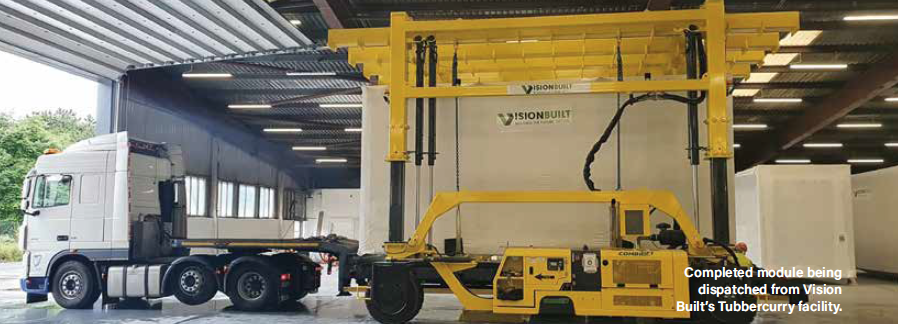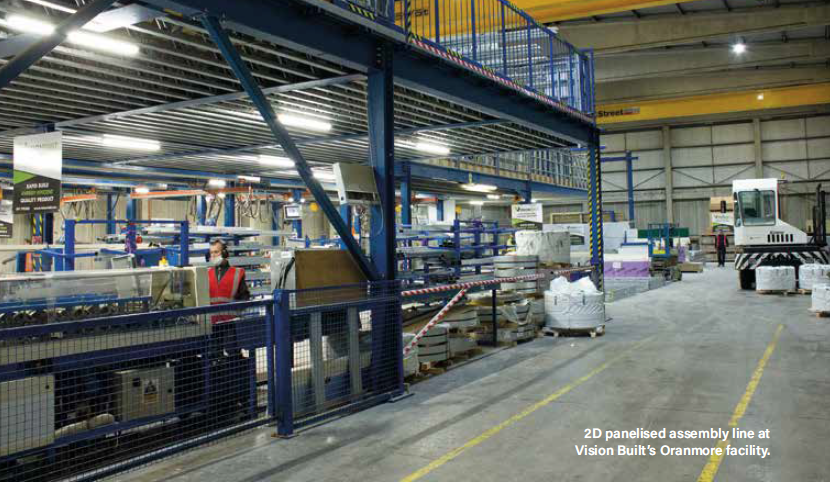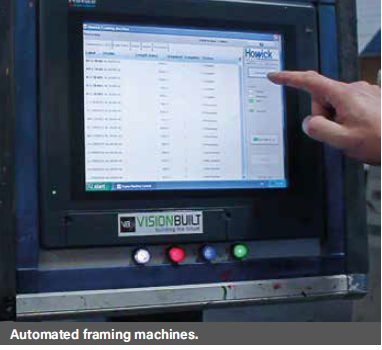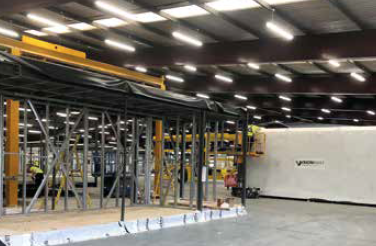Vision Built Managing Director BRIAN KENNEDY speaks to Barry McCall about the rapid changes in the market that have brought about a much more widespread appreciation for the benefits of off-site construction.
In Ireland, modern methods of construction (MMC) have been a little slow to take off, but that that is changing, says Brian Kennedy, Managing Director of off-site fabrication specialist Vision Built.
The company, which fabricates a range of innovative building structures for Ireland and the UK at its manufacturing facilities in Oranmore, Co Galway, and Tubbercurry, Co Sligo, has witnessed some quite profound changes in the market over the past 18 months.
“Covid-19 brought about so much change in the market in the past 18 months,” Brian Kennedy notes. “Part of that change was Brexit-related, but a big part of it was due to Covid-19. The industry was on the cusp of change anyway due to the shortage of trades on the one hand and an increase in volume output on the other.”

That, in turn, has brought about an increase in interest in MMC and off-site fabrication. “There has been a lack of trades to meet demand in the residential market in particular. That led to a huge increase in interest for off-site methods for low-rise apartments.”
Other forces were at work as well.
“Other critical factors came into play, such as the growth in sectors like pharma, data centres, healthcare, and education. There was keen interest in off-site construction due to its speed and the volumes required. We saw significant growth in the market because of that, and we increased our capacity to meet it.”
Three-fold growth
“That has opened up new markets for us,” continues Kennedy. “We are now able to supply full volumetric buildings for the education and healthcare sectors, and we also see a future pipeline in data centre and pharma projects. We have already won a number of contracts on the back of our recent education projects.”
Growth has been truly impressive.
“We tripled revenue and grew employment from 25 to 60 people,” he continues. “This was in line with demand in the home market. A lot of our new business in 2020 was in Ireland. For the previous 10 years, the majority of our business was in the UK, where there has been very strong demand for MMC for a long time.”
UK projects have included a number of hotels and commercial developments as well as novel rooftop extensions to existing buildings.
“There is a lot of interest in building up in the UK, and our lightweight modular units are ideally suited to that.”
Reducing lead times and delays
Vision Built has a unique offering with its manufacturing and assembly capability. The business manufactures its own light-gauge steel for both panelised and volumetric units, which allows the company to have direct control over the manufacturing of its core product. This advantage reduces lead times and de-risks projects from third-party delays.
In addition, the 100,000 sq-foot Tubbercurry facility includes an innovation space for the creation of prototypes, test assemblies and mock-ups.
“The additional factory space allows us to grow our product offering while producing for large-scale, high-profile projects for national and international markets. With over 75% of the work complete in our west of Ireland factory, we are creating local employment for construction trades and upskilling local non-construction- related labour to meet the demand,” says Kennedy
Broad customer base
Vision Built also offers services to other contractors.
“We work with many different contractors and developers across a range of sectors,” says Brian Kennedy. “We supply direct to government bodies like the HSE, the OPW and the Department of Education. Along with our turn-key offering, we can design, manufacture and install our products with other contractors bringing in follow on trades to complete the fit-out.”
Digital twin technology
The other driver behind the increased interest in off-site construction is technology development.
“MMC is not a new phenomenon,” Kennedy points out. “It’s been around for years, but we haven’t seen huge growth, particularly in Ireland. The difference now is the tools and knowledge we have. Digital twin technology is critical to its success. It doesn’t start in the factory. It starts with the design concept and moves on from there. Digital twin technology means that all the challenges and problems are understood and resolved before manufacturing begins.”
And the benefits are clear.
“It ensures high quality and much greater productivity, and fewer workers are required on site. Having units built at ground level in a controlled environment and lifted into place later is much more efficient and safer. The beauty of light-gauge steel production is the incredibly accurate automated manufacturing process. With a focus on quality in design, the automated process allows accurate manufacturing and assembly due to the rigid tolerances achieved with the product. These are the reasons why the time for MMC is now.”
Future opportunities
Looking to the future, Brian Kennedy sees continued high growth in Ireland, the UK and Europe for MMC. However, he believes more needs to be done on standardisation in order to aid exports and the use of the technology across different sectors. This is required particularly in the residential market to meet the scale of delivery needed for the next decade.
“Everyone will benefit from that, not just the construction industry. It’s a very exciting space to be in, and this is a fantastic time for Vision Built,” he concludes. “We are very excited about the quality and innovation our team are bringing to the market, and the future looks very bright,” Brian Kennedy concludes.





